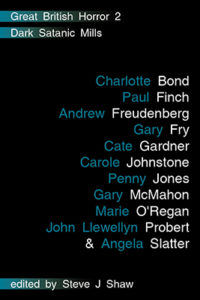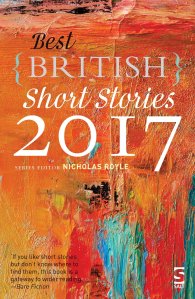Great British Horror 2

Dark Satanic Mills
Black Shuck Books 2017
Edited by Steve J. Shaw
Paul Finch, Cate Gardner, Andrew Freudenberg, Charlotte Bond, Angela Slatter, John Llewellyn Probert, Marie O’Regan, Gary Fry, Penny Jones, Gary McMahon, Carole Johnstone.
When I review this work, my thoughts will appear in the comment stream below…

 “It was one of those sneaky summer days, one that lounges around a chilled August, making a wild and unpredictable cameo, hoodwinking you into knits, swindling you out of sandals.”
“It was one of those sneaky summer days, one that lounges around a chilled August, making a wild and unpredictable cameo, hoodwinking you into knits, swindling you out of sandals.” I read and reviewed the next story in January 2017 and below is what I wrote about it
I read and reviewed the next story in January 2017 and below is what I wrote about it 
https://dflewisreviews.wordpress.com/2017/02/12/green-and-pleasant-land-gbh1/
“You must have heard all that stuff about Leather Apron?”
“half a brain” or one knife each.
“ho-hum press releases” or outright hokum? Or something drawn in to make each fame hunter, each Ripper sleuth, the ghost they sought? Half the ghost each?
A typical wonky torch or old eye-slits in mask and hood now pierced for new light?
This is a substantive narrative, page-turning, plain-spoken, the tension between a mundane investigation and a paranormal one, between gritty crime and supernatural horror. The Great Northern Hotel itself in this rundown town is the story’s main character, though, with creepy dereliction and remains of an old flea market. Is it truly alive or is it imagination? Whatever the case, two mercenary investigators of a murderous history risk being its bait to make history carry on. And without a constant smooth transition of history, we’d have no future life for our existence and thus for becoming in turn the next stage of someone else’s history…
stropping the apron forever.
My previous reviews of this author: https://dflewisreviews.wordpress.com/tag/paul-finch/ and https://nullimmortalis.wordpress.com/2010/08/24/groaning-shadows-by-paul-finch/
“distracted by Trill’s strop,”
Trill is “Age four or five or maybe sixty-two” and this story is either a masterpiece already – one of resonant, even magical, darkness and whining razor wire and some disguised bleach and an ill-stuffed doll with which she toys – or the accretion of yet another promise towards real masterpieces in the future from this author. Trill, not birdseed but a real person, in her nightie that she uses at the end as a flag, the end of a series of changing motives concerning the man who looks after her and another man who is a dangerous escapee from the prison neighbouring her hovel. The disguised decoy of a trail of blood she earlier makes in the dark unsafe streets may lead the reader astray, too, as to how the previous story’s split personality (now here a split age between girl and woman) will affect you. Pity at such a woman’s lot or self-disgust at what you might feel for the same person when younger whatever her lot? The excuse of the unclear and misjudged margins between the razor wire that you crossed or a lifetime of guilt? A doll’s thin blood or apple juice bleach? For you, read you, whatever your charity. Scatter the birdseed to see who pecks it up. Or build the fragments into a whole.
My previous reviews of this author: https://dflewisreviews.wordpress.com/tag/cate-gardner/
“, scrabbling for a silver lining.”
“I expect they’re still scraping him off the tracks.”
A story of a couple and their very young daughter Emma, their beloved little monkey. During hard times. When trains were held up by the self-gutted. And the father worked in a lab coat for a nameless scanner. A trenchant tension between what is possible and what is unthinkable, when their daughter goes missing. An oblique or deadpan reflection of our times. Written in a style too pedestrian or workmanlike for my own personal tastes in literature, but it indeed somehow seemed to work, whatever was naively or implausibly working against it! Telling a story seemingly that has never been told before, which is an extremely rare thing to be able to claim about any story. A silver lining.
Charlotte Bond’s ‘The Lies We Tell’
“; her dreams are filled with jaws that go clickety-clack and bills from utility companies that have numbers so high she can’t comprehend them.”
Another plain-spoken but ultimately effective and arguably original horror story, this one conveying humanity’s endemic fake-news as the bedrock of their natural habitat of existence, here recorded as if by the Tally-Man from my 1950s childhood – although this is a typical modern nuclear family of hard-pushed parents and their two children, all of them with modern accoutrements like apps that need firing up, a scenario where a monster’s name created by parents to stop children lying, doesn’t stop at least one of those parents lying, until… Well, that would be telling.
“You’re just a story.”
“So many stories and for so long that it was hard to tell if what you were being told was new or old.”
A story of burnt mattress backstory as a girl child and repercussions when a social worker in tune with fate’s pale lady, urban realities and visions morphing to fit. About a woman social worker in dark Britain where some places stay insipidly light and others stay dark. An increasing mixture of memories haunting the future. Some nice phrases that will stay with me. But ultimately, I wasn’t sure.
Telling synchronous link with my earlier Tally Man reference to the previous story, though. “Ten lots of ten. Then another ten lots of ten.”
My previous reviews of this author: https://dflewisreviews.wordpress.com/tag/angela-slatter/
Suddenly, I found myself pouncing upon the book itself and tore out this story – hopefully not leaving any residual bits of it behind. You should doubtless thank me.
https://dflewisreviews.wordpress.com/?s=Probert&submit=Search
“; the house had originally come into the Wyer family when it was bought by his great-great-grandfather, who’d owned a firm of sweeps.”
Working-class wireless-soot-cleaning businessman, Seth Wyer, also grinned “wryly” at the state of this electrically unwired house, or possibly at the hen-pecking of his wife…or at the scope of the renovation ahead of this inherited house or, as it turns out, its haunting.
I am a sucker for soot-sweeping hauntings and this one, although a bit too plain-spoken for my tastes, is eventually not a disappointment. With some original ideas, too, not least being the concept embodied by the title and this concept’s implications with the ending of the story, and, despite a bit of narrative naivety and last change of pov, the work creates a scenario that becomes frightening with its imagination-provocation, which, for me, is the point of it.
My previous review of a story by this author: https://nullimmortalis.wordpress.com/tag/marie-oregan/
Another recommended soot-sweeping story ‘The White Wyrak” by Stefan Grabinski, reviewed here. (My underlining.)
“It’s only a horror film, sir,”
A nifty Fry to add to my collection. About a maverick schoolboy as a horror genre fan called Dean Wetley (Dean Wesley?) as suspected – by another less horror orientated boy – to be something more than just a fan of horror but one with real dark occult motives to interpretably symbioticise their headmaster…or so surveillance begins to attest in this township with the required Station Road, if with letters missing…or letters still morphing further along a smooth silk road of evil towards what a woman bystander says innocently at the end, something that somehow clinches the startling core of this otherwise contrivably storified horror-genre-about-horror-genre infest. Meticulously styled, if marginally with a prose too thinly textured for my tastes. And I loved the idea of the heavy correction-marking of schoolwork in red as a ‘bloodbath.’ (STATINs clear out the muck from the blood?)
My previous reviews of this author: https://nullimmortalis.wordpress.com/2010/09/25/gary-fry-gary-mcmahon-my-real-time-reviews/
“He’d heard that the new money was made from animals,”
…and now that old war-bombed residences in London are made from the dust they once almost became? Dust in forms that deter fire as well as people? The almost caricatural dystopia of today’s City and the contact-resistant mutually deterrent people also begin to be believable here while we follow a man working nights, having left the parental home, resorting to the lowest affordable accommodation. An attritional narrative of stylish floury longueurs, somehow literally eating away at the reader, too! And I am getting used to sudden disarming changes of POV at the end with this story following that in the earlier O’Regan. Soot and dust, alike.
“He’d heard that in the city you were never more than ten foot from a rat,”
“The principles of martial kata – form, technique, spirit, rhythm, balance, and placement – all held true for this particular series of movements.”
In many ways, this plainspoken tale has inspired. Not necessarily because of any intrinsic virtue it holds as a story in itself. But, personally, as some sort of echo of my own night moves, the ones I have used to review this book and others for the last ten years. Most books I instinctively choose seem to click into place as susceptible to night moves rather than daylight ones. It is almost as if, for example, I go into this book’s city downtrod pub, alongside the jobless protagonist who seeks his own gestalt through kata, through recurrent solo kata movements nights (evocatively described by this text), such occasions in a derelict warehouse – and synchronously, preternaturally, Forteanly, serendipitously (call it what you will) I meet someone in the pub with a randomly acquired smartphone that itself has a chance delivery to its screen of information regarding the loculus or gestalt I seek. This story itself, though, is, of course, not a downtrod pub; it surely is my Hoodoo.
Age and relative youth interchangeable?
“These were no longer separate parts, but different aspects of the whole.”
My many previous reviews of this author: https://dflewisreviews.wordpress.com/746-2/
“Anyone with any sense is inside something.”
“A real bowder, my granny would have said. A day for staying in bed with another, warmer body.”
Following those quotes, especially, this Glasgow story seems apt on this very night, as I write this review, when the city has a rare RED weather warning!
This work has the Glaswegian dialect to negotiate. I wish you luck to get into the milder, less inimical narration itself to appreciate the characterisation of its narrator, a woman police boss, and the implicit condescension shown to her by rules of team protocol, the behaviour of manning up with jokes to keep her team compliant and at a top level of professionalism amid such banter. Yet, here, humanity and life is never professional, and her own private backstory of personal baggage becomes actually part of the new investigation…
“At this rate, a fresh pair of severed hands will be turning up somewhere in the city every bloody day.”
Gives a new dimension to a hand saw, I guess. An explicit Hand the Ripper to match the Jack version in the Finch, bracketing this book neatly. And the dialect dialogue beautifully fits the phonetic notes left by the serial ripper, in dissonant collusion with Glasgow postal codes. All very intriguing. News & Booze also being a good name for such a shop, anywhere, not only Glasgow. This story, not Horror Fiction, but Crime? Well, severed hands seem to provide a suitable thumbs up or two fingers for this book, whichever you decide.
My previous reviews of this author – https://dflewisreviews.wordpress.com/carole-johnstone/
*
My own instinctive thumbs up for the book – as assembled by all my thoughts above – stems, I think, from its provocative gestalt eventually clinched, intentionally or not, deservedly or not, by the McMahon. Meanwhile, the real monster is the story ripped out of me by the Probert, only for it now to be put back in.
(…the monster to become the diseased reader, still absorbing the creative cancerous darkness without which there can be no contrastive wholesome light, a gestalt as a constructive symbiosis within reality, a potential curative for humanity’s spirit as well as body by embracing all opposites in the synchronised shards of random truth and fiction. The bad and good, the new preternatural protocols of making imperfect life and its mortality at least slightly better than one ever hoped might be possible.)
“But my point is he has to know what he’s doing very well to do it so wrong.”
end